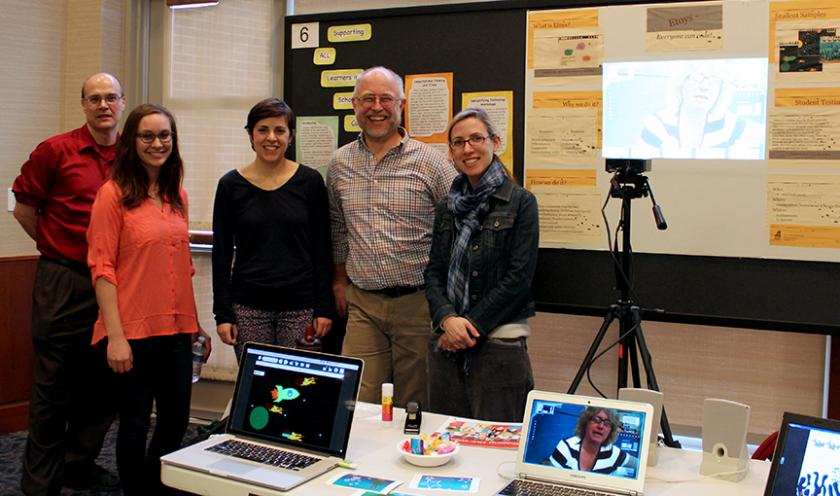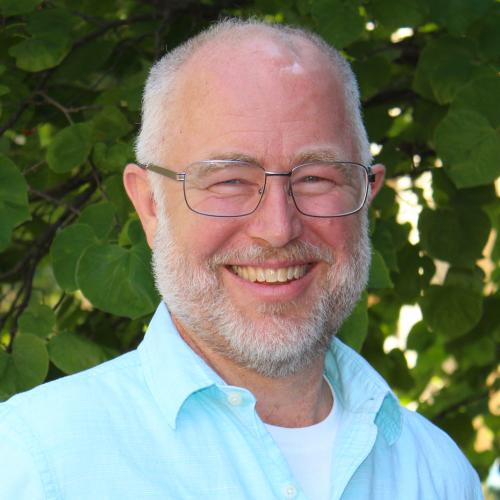GSLIS faculty, staff, and students are included among the presenters at the sixth annual University of Illinois Public Engagement Symposium on March 11, 2014. The symposium will feature poster presentations and displays on community engagement projects. All symposium activities will focus on this year's theme, Shaping Our World.
The symposium is free and open to the public and is sponsored by the Office of Public Engagement and the Center for Innovation in Teaching & Learning.
Presentations with connections to the Center for Digital Inclusion and GSLIS include:
Supporting ALL Learners in School-Wide Computing
Participants: Martin Wolske, GSLIS; George Reese and Avigail Snir, Office for Mathematics, Science, and Technology Education (MSTE), Maya Israel, assistant professor in the College of Education; Todd Lash and Jessica Pitcher from Kenwood Elementary; Tanya Tapia, PhD candidate, Education; Jamie Pearson, PhD candidate, Education; Samaa Haniya, PhD candidate, Education; Casey McCoy, MS student, GSLIS; Becky Ransberger, MS student, GSLIS; Kim Naples, MS student, GSLIS; Angie Stangl, MS student, GSLIS
Abstract: National initiatives have raised awareness of the importance of developing innovative approaches to science, technology, engineering, and math (STEM) education, especially within elementary and middle schools. This presentation will highlight approaches currently underway within Kenwood elementary school to advance computational thinking as part of building inclusive digital communities. We especially emphasize work with entire families whose students are at risk of academic failure. We take a multi-stakeholder community building approach to the development of computational thinking, tapping into the school librarian as engagement leader. It builds from the assets brought to the initiative by school administrators, teachers, librarians, and technical staff, as well as students, parents, and community leaders. The approach creates a school-wide and community-deep community of inquiry to share innovative approaches and lessons learned. A multidisciplinary team of faculty, staff, and students from the University of Illinois Office of Mathematics, Science, and Technology Education, the Center for Digital Inclusion, the College of Education, and Computer Science have served as advocates, trainers, and lead evaluators in this elementary school-led initiative. The presentation of our work with EToys and the Demystifying Technology workshops will include both hands-on opportunities and examples of artifacts created at Kenwood.

Fostering Digital Literacies, Innovative research and Entrepreneurship with the Fab Lab network
 Participants: Jeff Ginger, Champaign-Urbana Community Fab Lab; Lisa Bievenue, Assistant Director, Informatics; Robert McGrath, Retired Computer Scientist; Dean Rose, Blacksmith; MK Watson, Retired School Teacher; Gary Watson, Former Power Plant Worker; Virginia McCreary, PhD student in Material Sciences; Andrew Knight, Student in Agricultural Engineering; George Ray, Student in Aerospace Engineering; Shayna Egan, Grad Student in Metalworking; Chris Nixon, MS student, GSLIS; Joel Spencer, Librarian, TUFL; Amber Castens, Librarian, TUFL; and other Fab Lab volunteers
Participants: Jeff Ginger, Champaign-Urbana Community Fab Lab; Lisa Bievenue, Assistant Director, Informatics; Robert McGrath, Retired Computer Scientist; Dean Rose, Blacksmith; MK Watson, Retired School Teacher; Gary Watson, Former Power Plant Worker; Virginia McCreary, PhD student in Material Sciences; Andrew Knight, Student in Agricultural Engineering; George Ray, Student in Aerospace Engineering; Shayna Egan, Grad Student in Metalworking; Chris Nixon, MS student, GSLIS; Joel Spencer, Librarian, TUFL; Amber Castens, Librarian, TUFL; and other Fab Lab volunteers
 Abstract: The Champaign-Urbana Community Fab Lab is a small-scale workshop for computer-based innovation, design and fabrication. The Fab Lab allows you to dream up, design and make all kinds of contraptions and systems using open source software and DIY equipment. In many ways it is a kind of modern-day inventor’s workshop, continually abuzz with cutting-edge technologies, progressive ideas and passionate people. Our Fab Lab is a member of a large network of Fab Labs that span the entire world, from Spain to Afghanistan to Japan, who are all networked through the MIT Center for Bits and Atoms. One of the dimensions that makes our lab truly unique, however, is that we realize not everyone in the community is able to visit the University of Illinois campus. As a result we run demonstrations at events around town, bring in community groups through specific partnerships and programs and have even established a couple of mini Fab Labs in sites actually in the community, including a very successful effort at the Urbana Free Library, which includes an open lab for teens that happens 3 days a week and sees between 20 and 40 participants a day. We have also recently joined forces with the Tech Hub initiative, a collaboration between Engineering, Art, Informatics and Library Science to offer increased support for University classes, new workshops, improved production capabilities, additional open community hours and more partnerships with community organizations. Our table will present on how the Fab Lab relates to teaching, research and entrepreneurship.
Abstract: The Champaign-Urbana Community Fab Lab is a small-scale workshop for computer-based innovation, design and fabrication. The Fab Lab allows you to dream up, design and make all kinds of contraptions and systems using open source software and DIY equipment. In many ways it is a kind of modern-day inventor’s workshop, continually abuzz with cutting-edge technologies, progressive ideas and passionate people. Our Fab Lab is a member of a large network of Fab Labs that span the entire world, from Spain to Afghanistan to Japan, who are all networked through the MIT Center for Bits and Atoms. One of the dimensions that makes our lab truly unique, however, is that we realize not everyone in the community is able to visit the University of Illinois campus. As a result we run demonstrations at events around town, bring in community groups through specific partnerships and programs and have even established a couple of mini Fab Labs in sites actually in the community, including a very successful effort at the Urbana Free Library, which includes an open lab for teens that happens 3 days a week and sees between 20 and 40 participants a day. We have also recently joined forces with the Tech Hub initiative, a collaboration between Engineering, Art, Informatics and Library Science to offer increased support for University classes, new workshops, improved production capabilities, additional open community hours and more partnerships with community organizations. Our table will present on how the Fab Lab relates to teaching, research and entrepreneurship.

